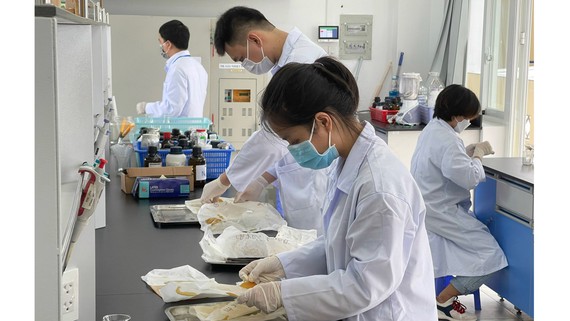 Society
Society

Universities and colleges in HCM City have developed plans to ensure safety for students returning to in-person classes after studying at home due to COVID-19 pandemic.

|
| Final-year students return to practice at a laboratory at the HCM City University of Food Industry on November 1. — Photo www.sggp.org.vn |
HCM CITY — Universities and colleges in HCM City have developed plans to ensure safety for students returning to in-person classes after studying at home due to COVID-19 pandemic.
Since mid-October, many universities and colleges in the city have allowed students to return to campus, and have prepared enough COVID-19 vaccines for students' needs.
Some schools have only given priority to final-year students who need to complete their scheduled study plans.
Students are required to comply with the government's 5k requirements and scan the QR code at the entrance school gates. They must have had two doses of COVID-19 vaccine or be fully recovered from the disease.
Many universities and colleges are concerned about the number of unvaccinated students and those who have received only the first dose. Many of the students have returned from provinces and cities with low vaccination rates.
The HCM City-based University of Medicine and Pharmacy has announced that it will reopen for in-person theory courses from November 29. Internships at hospitals and outside facilities will be announced when the school receives information from hospitals and facilities.
The school has coordinated with the HCM City University of Medicine and Pharmacy Hospital to make a list of students who have been vaccinated.
Its medical room is fully equipped with equipment and an isolation area, according to regulations of the Ministry of Health. Its dormitory also regularly checks to ensure pandemic prevention and control, and arranges sanitary equipment and trash cans with lids, and reminds students about 5K requirements.
Thái Doãn Thanh, vice rector of HCM City University of Food Industry, told Sài Gòn Giải Phóng (Liberated Sài Gòn) newspaper that it would welcome students back this month.
“About 2,500 students have not yet been vaccinated and will be given vaccinations,” he said.
In early November, the school allowed final-year students to return to campus to complete their studies, but they had to have two doses of vaccine and strictly follow the Ministry of Health’s 5K message.
Phan Hồng Hải, rector of the HCM City University of Industry, said the school’s students had to study online during the first semester of the 2021-2022 academic year. However, the school has now allowed students preparing for the coming graduation to join internship courses in small groups.
Around 2,000 students have been vaccinated, accounting for more than 70 per cent of students.
The school has prepared vaccine sources when students return. It expects to resume in-person classes in the second semester depending on the situation.
The Dormitory Management Centre of Việt Nam National University-HCM City (VNUHCM) said that it had received online registrations from 26,000 enrolled students for accommodations and will provide about 10,000 accommodations for new students.
The school’s dormitory will reopen to welcome students when it meets all pandemic prevention requirements.
Online study
The limitations of online learning compared to traditional face-to-face learning are clear, but the most obvious impact is the lack of interaction with others and ability to concentrate, Nguyễn Minh Hà, rector of HCM City Open University, said.
“Practical subjects, internships and others cannot be taught online, affecting students’ graduation progress.”
Students in engineering and technology majors are late for graduation because they cannot complete the credits for the practical courses.
From October 18-25, a research team conducted an online survey of 37,150 students at VNUHCM on the impact of the pandemic on the mental health of students.
The survey covered online teaching and student assessment, mental health and wellbeing of students, COVID-19 and students’ perspectives on careers, COVID-19 and personal and family financial management, opinions about policies to support learners, and personal information.
Assoc. Prof. Dr Nguyễn Phương Thảo, head of the research team, said the pandemic has had a significant impact on the mental health and life of adolescents, especially students.
The survey found that online learning pressure was ranked the highest among mental health problems faced by students, accounting for 65.1 percent of those surveyed.
In addition, the students were facing other problems, such as 58.9 per cent of them having anxiety about paying tuition fees, 27.7 per cent worrying about family conflicts due to different points of view, and 27.1 per cent suffering from overwork.
Nguyễn Thị Thu Hoài, a member of the team, said that online learning pressure was more common among first, second and third-year students.
Nearly 57 per cent of students lacked concentration or had no interest in studying. Many students were not satisfied with the quality of online courses, the survey found. — VNS




